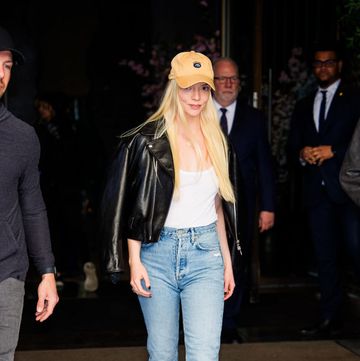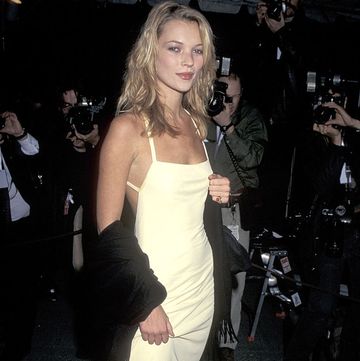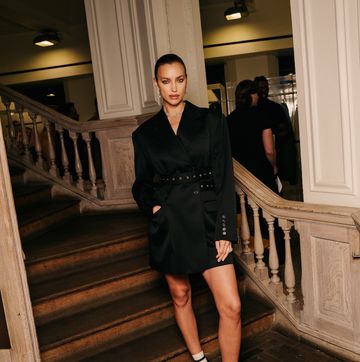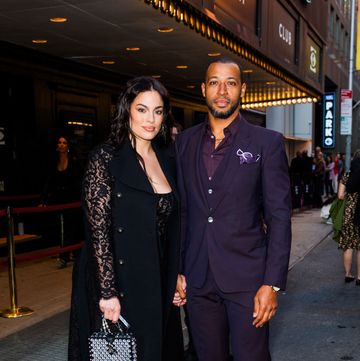With three UK number 1 solo singles, 19 Top 10 singles with Girls Aloud (including another three UK number 1 singles), and two wins as an X Factor judge, no one can argue that Cheryl Cole didnt establish herself in her 20s.
Of course, she was also unfortunate enough to go through a divorce and there was that incident where she was sentenced to some community service, but no one can have it all. And, as she turns 30 this weekend, we think she can look back on her 20s and be proud of what she achieved.
As our article in the April 2013 issue explained, we shouldnt waste our 20s on bad boyfriends or dead-end jobs, even if it is tempting to think weve got the rest of our lives to make the right decisions. Instead, we need to enjoy our defining moments.
So heres our article in its entirety. Maybe itll inspire you to achieve great things in your life, just like Cheryl has.
Let us know what you think tweet us @ELLEUK.
Words by Dr Meg Jay
See Cheryl Coles 20s in fashion
Listen to our Girls Aloud playlist on Spotify
Every Tuesday morning at 10am, 26-year-old Rachel drops on to the couch in my office, where I work as a psychologist, and recounts another week with her boyfriend. A hurtful comment about her body. A time after sex when he pushed her face away as she tried to cuddle. When I press her about why she stays, she shrugs unconvincingly and says, Its fine. We have a lot of fun the rest of the time. And Im 26. This relationship doesnt count.
Then, at 11am, I have an appointment with a 27-year-old woman who says her bartending job doesnt count, that as long as she gets a real job by 30 shell be fine. And at noon I see a 25-year-old who tells me that her unhappy, four-year live-in relationship doesnt count because shes just killing time.
Then I see a 30-year-old who says, My twenties are over and I dont have anything to show for myself. I had a better CV the day after I graduated. And then I see a 33-year-old who reminds me of my first client of the day when she says: Dating in my twenties was like musical chairs. Everybody was running around having fun but then suddenly the music stopped and everybody started sitting down. I didnt want to be the only one left standing up. Sometimes I think I married my husband because he was the closest chair to me at 30.
There are nearly eight million twentysomething women in England and Wales, all of whom deserve to know that, far from being an irrelevant downtime, our twenties are a developmental sweet spot that comes only once. Eighty per cent of lifes most defining moments take place before you are 35. Eighty per cent, everyone. Two-thirds of your lifetime wage growth happens in the first 1o years of your career. More than half of young adults are married, dating or living with their future life partner by age 30. Shrug your twenties away all you like, but they really are your defining decade. Your personality can change more (for the better) during your twenties than at any other time in life as long as you engage with adult roles. Female fertility peaks at age 28. And as the brain finishes off its last growth spurt in our twenties, our brains wire us to be the adults we will be for the rest of our lives.
Our twenties are a time when the things we do or dont do will have an enormous effect across years and even generations to come. So listen up, because this isnt what twentysomethings are hearing. They hear that their twenties are an extended adolescence or an emerging adulthood. They hear they are supposed to be having a protracted quarter-life crisis. They hear that the slower path to adulthood is better. They hear that 30 is the new 20. The twenties have become a sort of Las Vegas in the life cycle, a time when what we do isnt real, when our choices dont count. Popular culture has trivialised the most defining decade of adulthood. Its time to make your twenties count.
Of course, it is better to finish your education or start work before you get married. But this idea has been misunderstood by the media and, I think, by twentysomethings themselves. It has been taken to mean that doing something later is the same as doing something better.
If youre in your twenties and still thinking, When I grow up you need to start thinking about how to create the life you want for yourself, now. In 10 years time many decisions will be behind you and your options will be limited. The thing twentysomething women have going for them is being in their twenties. But the choices you have now should be used to start creating the life you really want not as an excuse never to make a decision.
When I was a twentysomething graduate student, I saw my first psychotherapy client, a 26 year old named Alexandra. When Alex was assigned to me, I felt relieved. I hadnt been a graduate student long enough to be an expert in anything, but the twenties I thought I could handle. When my supervisor pushed me to challenge Alexs relationship, I protested. Work happened later, marriage happened later, kids happened later, even death happened later. Twentysomethings like Alex and I had nothing but time. Sure, shes dating a loser, I said, but its not like shes marrying him. Then my supervisor said, Not yet. But she might marry the next one. The best time to work on Alexs life is right now, before shes committed to just one option.
So what you can you do now to make sure the decisions youre making are going to set you up well for the future, not lead you down a blind alley?
Put in the effort. Take your twenties seriously. Advanced degrees or jobs abroad might seem like decisions youd rather make later, but they are easier in our twenties before marriages and mortgages take hold. As unglamorous as these pursuits may feel, such pieces of what we call identity capital will be what makes you memorable and relevant later. Identity capital is the currency you take to the adult marketplace to metaphorically purchase the jobs and opportunities you want. Research suggests its todays fortysomethings who have been hardest hit by the economic downturn; studies of past recessions, however, show that twentysomethings can recover the losses of underemployment if they move through their twenties strategically. Earn as much identity capital as you can. Then when the economy is ready to run, you will be, too.
Know the strength of weak ties. Those who come of age during tough times like now are more inclined to believe success depends on luck. But as a fortune cookie once said, A wise man makes his own luck.
The single best thing you can do to create luck is to tap into what is called the strength of weak ties. Ever since Friends first aired, the twentysomething years have been portrayed as a time when you huddle up with your strong ties: your best friends, your urban tribe. But you are hearing it from me: the urban tribe is overrated. Twentysomethings who cluster together with only like-minded peers limit who they know, what they know, how they think and where they work. That new job even that new person to date almost always comes from outside the inner circle. This is the time to be connecting, not just with the same old people having the same old conversations about how work is lame or how there are no good men out there, but with those less familiar acquaintances who might see things a little differently.
Weve all heard the saying, You cant pick your family but you can pick your friends. That may have been true growing up but soon you will pick, when you marry or partner up and create a family of your own. Many of my clients, like Rachel, willingly have low-criteria or no-criteria relationships in their twenties because they dont think it matters. But setting bad dating habits can be dangerous. Besides creating low expectations, suddenly that person we never had any intention of staying with might begin to look better than starting over, especially as the engagement notifications on Facebook start popping up. Use your twenties to direct not just your sexuality thats the easy part but relationships as well. It is never too early to be as ambitious in love as you are at work.
The composer Leonard Bernstein said that to achieve great things you need a plan and not quite enough time. And believe me, you dont have as much time as you think. Use that knowledge to spur you on. Dust off your plan and start on it, today. Say to yourself what I said to Rachel, what I say to my twentysomething clients every day: 30 is not the new 20. Claim your adulthood. Get to work. Meet someone new. Pick your family. Dont be defined by what you didnt know or didnt do.
You are deciding your life right now.












